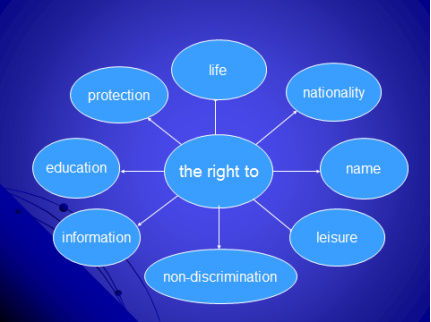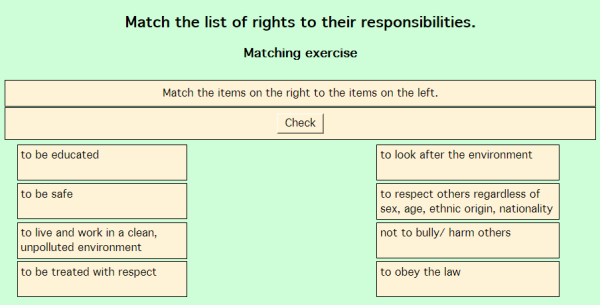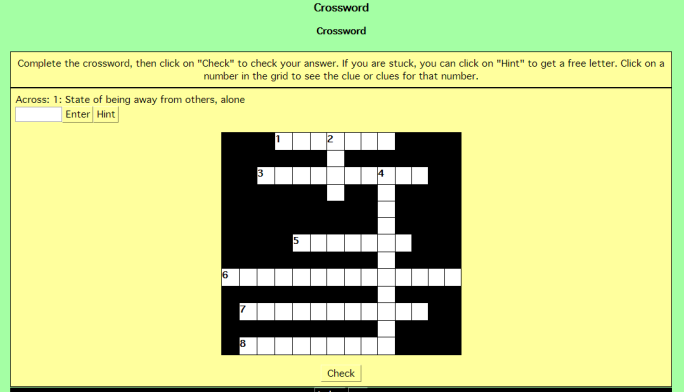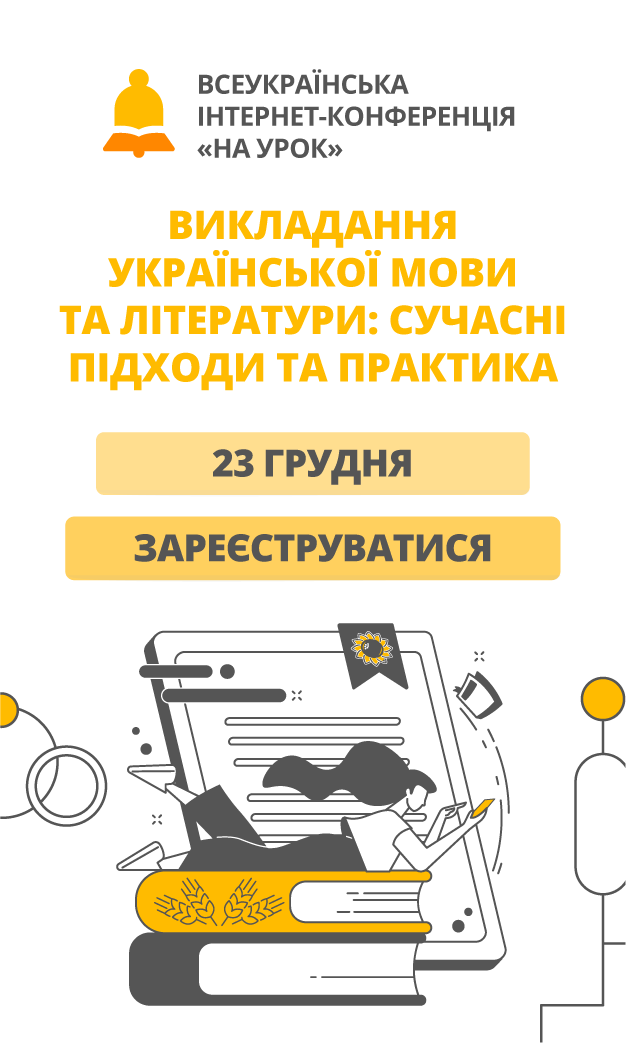Урок “Rights and responsibilities”.
Тема уроку “Rights and responsibilities”.
11 клас
Мета та завдання уроку:
1. Розвивати навички комунікативної компетенції:
- Усного мовлення на основі непідготовленого діалогу – обмін інформацією.
- Аудіювання на матеріалі відеороликів та аудіотекстів. Використовувати різноманітні види контролю: відповіді на запитання, множинний вибір та заповнення пропусків у тексті належною інформацією.
- Читання тексту з метою розуміння основної інформації.
2. Практикувати учнів у вживанні лексичного матеріалу по темі “Human Rights”, повторити способи словотворення «прикметник-іменник», «дієслово-іменник».
3. Знайомити учнів з деякими країнознавчими поняттями, такими як «Організація Об’єднаних Націй», розширювати їхній світогляд.
4. Розвивати розумову діяльність учнів, включаючи увагу, пам’ять, логічне мислення, мовну здогадку.
5. Сприяти підвищенню інтересу та мотивації до вивчення англійської мови. Спонукати учнів удосконалювати свій рівень знання англійської мови .
6. Сприяти вихованню толерантності, правової грамотності у повсякденному житті.
Обладнання: презентація, тести, аудіо та відеофайли.
План уроку:
- Організаційний момент.
- Введення до іншомовного середовища .
- Фонетична зарядка.
- Активізація лексичних одиниць по темі.
- Аудіювання тексту.
- Музична пауза.
- Читання тексту.
- Аудіювання з метою вилучення потрібної інформації.
- Домашнє завдання.
- Рефлексія. Підведення підсумків уроку.
Ход уроку:
1. Good morning. I am glad to see today. How are you today? Let’s start our lesson.
2. You are going to see a video fragment. Please, watch it and guess what our lesson will be about.
P. about human rights
You are quite right. The theme of our lesson is “Rights and Responsibilities”.
3. Let’s practice your phonetic skills. Listen and repeat.
Private – privacy
Suffer – suffering
Racial – racism
Tolerant – tolerance
Cruel – cruelty
Equal – equality
Ethnic – ethnicity
Protect – protection
Declare – declaration
Discriminate – discrimination
Prohibit – prohibition
4. So, what is the right? What rights do you know? What are your rights at school, at home?
Rights (possible student’s answers)
|
the right to life the right to have a name and a nationality at birth the right to education the right to health and health care the right to information the right to have a rest and leisure the right to privacy the right to labour, work the right to social welfare, etc. the right to be safe to tell what I am feeling to be listened to to participate in cultural life of a community |
meet or associate with others choose their own friends choose their work practice own religion express own opinions believe what they wish vote ask to change unfair laws own property take part in meetings demonstrations be treated kindly to ask for help to work in a quiet classroom live in a family |
I see you remember the peoples’ rights quit well. Look at this spider gram. Here are only some of human rights. read them aloud, please.

But as you know, every person has not only rights but responsibilities as well. Of course, you also know that we should answer for our actions because every action has consequences that may affect not only your own lives but the lives of others.
What are your responsibilities at home, at school? What duties do you have at home?
Responsibilities (possible student’s answers)
- Our responsibilities: To do my best / To do homework / To keep classroom clean /
- / To be kind / To use my time wisely / not to break the laws
- To not bully others / To use school books neatly / To respect people.
Match the list of rights to their responsibilities.
Test “Hot potatoes”

Now I want you to do some vocabulary work.
Complete the sentences with the phrases:
have no right
have the right to
have the responsibility to
do their bit,
take responsibility for
stand up for your rights
1. You shouldn’t let your employer make you work so many hours. You should …!
2. You … to speak to me like that!
3. As the captain of the basketball team, I feel I … go to all the practices.
4. We all … freedom of speech.
5. Who’s going to … organising the picnic next week.
6. I think everyone should … for the environment.
Choose the correct verbs.
1. No one should be allowed to violate / abolish someone else’s rights.
2. Jane has been given / put the responsibility of buying a birthday present for Kim.
3. Many people in the world are rejected / denied their basic human rights.
4. Matt knows he was to blame for the fire. He accepts / receives responsibility.
5. Ann often says nasty things to her sister. I think she deals / treats her very badly!
6. Lawers offend / defend the rights of their clients.
7. I can’t tolerate / face his attitude any more! I think it’s disgraceful!
8. There are campaigns to violate / abolish the death penalty in several American states.
5. Now we are going to do some listening exercises. Listen to the speakers. For questions 1-3, choose A, B or C. You can hear the recording twice.
6. Are you tired? Let’s do some exercises for your eyes.
Look left, right
Look up, look down
Look around.
Look at your nose
Look at that rose
Close your eyes
Open, wink and smile.
Your eyes are happy again.
7. Now let’s answer the question that was at the beginning of our lesson.
What are human rights?
Human Rights are things that we all should have or to be able to do.
Who are they for?
For everyone. Each person in the world has human rights.
Human rights are the basic rights and freedoms that belong to every person in the world. (Every man, woman and child ) Although they can sometimes be restricted, human rights can never be taken away from you.
Which rights seem (the) most important to you.
Right to live, to work, to education
I can’t agree with you. Every human right is important! Every human right is needed to live and grow – and to be a human being! Human rights are indivisible. All rights are equally important and necessary for life and dignity – there are no rights which are more important than others.
There are different laws that protect human rights.
Do you know any of such laws? In our country.
The Constitution of Ukraine.
And any international laws? The most important is The Universal Declaration of Human Rights. Now let’s learn some facts about the Declaration of Human Rights.
Робота з текстом. Подбір заголовків.
The Universal Declaration of Human rights
Read the text and match the headings (A-E) with a paragraph (1-4) There is one heading that you do not need to use.
Answer my questions.
What is the Declaration?
It’s a document written by the United Nations which states that all people in the world have certain rights.
What organization adopted the UDHR?- the United Nations
When and where was the Universal Declaration of Human Rights adopted? - It was adopted in 1948 in New York.
What is the Ukranian translation for the Universal Declaration of Human Rights?
8. Аудіювання, заповнення пропусків інформацією з тексту
Now you know more facts about the Declaration. Right? We are nearly at the end of the lesson. I want you to watch one more video. While listening to the text you’ll have to fill in the blanks with the proper words.
Watch the video
And complete the sentences:
- The Universal Declaration of Human Rights
Was written in 1948…(1). Millions of people perished in the second World War. Many countries were still deeply divided by racism and military oppression. So the …48 (2) countries of United Nations got together and decided that ENOUGH was ENOUGH! So they would sit down and wrote 30 (3) articles. That’s the 30 (4) rights and freedoms which belong to all of us.
- Article 1. We are all born free…(5). We have our own thoughts and ideas and we should all be treated the same way.
- Article 9 says nobody has the right to put us in prison without good …reason (6), to keep us there, to send us away from our country.
- Article 15 We all have the right…(7) to belong to the country.
- Article 18 says we all have the right to believe in whatever we like, to have a religion…(8) and to change it if we wish
- Article 19. We all have the right to make up our own minds, to think what we like, to say what we like and to share our thoughts with other people
- Article 30. says that nobody can take these rights and freedoms away from us. They belong to everyone.
Here are some simplified examples of some of the articles in UDHR -
Do the crossword.
1: State of being away from others, alone
2: Personal opinion
3: Keeping safe
4: News or knowledge given
5: Spare time, time free from work
6: Ability to treat differently, to make distinctions
7: Being a member of a nation
8: Training and instruction, knowledge and abilities

9. Write down your homework. Ex…..in Workbook
Thank you for your work. You’ve worked really hard today. Your marks are…. Our lesson is over. See you soon. Good bye.
10. Reflection. (Рефлексія)
Our lesson comes to its end. Did you like it? People all over the world speak so much about rights and responsibilities nowadays. Do you think these problems should be discussed or is it of no use talking? This is not our last lesson on this topic and we will definitely continue our work.


про публікацію авторської розробки
Додати розробку
